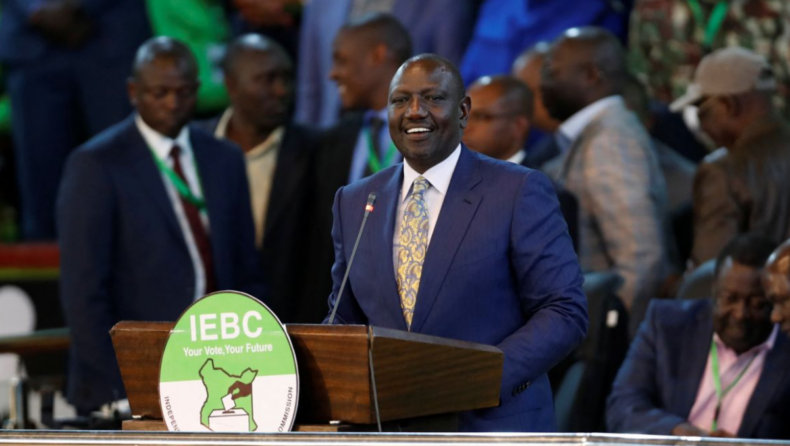Influence of church on William Ruto, the new Kenyan president.
Kenya got its first evangelical Christian president recently. William Ruto, the 55 year old, newly sworn president, is here to make church his focus as it helped him win the race of Kenyan general elections.
Right after the Supreme Court upheld his election victory, he got on his knees to pay with his wife Rachel and other party leaders, especially a Muslim leader, which showed the co
Countrymen that despite having strong Christian beliefs, he welcomed and respected people of all religions.
The Chief Justice, Martha Koome, called his victory “a work of God”.
Ruto and his wife, Rachel, have even built a chapel at their residence, in the city of Nairobi, Kenya’s capital. Rachel has held prayer meetings frequently, and William Ruto has complimented her work and given her work credits for being one of the reasons behind his victory.
His campaign’s religious credentials were bolstered by new Deputy President Rigathi Gachagua’s wife, Dorcas, a retired banker who became a pastor.
Demographics of Kenyans:
85% of Kenyans are Christians.
| Protestants | 33% |
| Catholics | 21% |
| Evangelical Christians | 20% |
| Believing in African churches | 7% |
| Muslims | 11% |
How did the church work in Ruto’s favor?
When Ruto was the deputy president, the then president, Uhuru Kenyatta, a Catholic, was said to be highly influenced by Ruto’s religious beliefs.
This happened significantly when the duo was trying to clear their names over charges pertaining to violence, which took place after the heavily disputed general election of the year 2007, at the International Criminal Court.
The pair began to attend evangelical prayer meets to avoid being put on trial and attempted to gain and gather as much public sympathy as they could by showcasing their religiousness.
This, subsequently, aided them in having the charges against them dropped in 2014 and in 2016.
Ruto’s opponent, Raila Odinga, made a mistake by speaking about how Christianity leads to “brainwashing” and when his wife said that churches needed to be regulated by the government.
This made the Christian majority countries feel more in touch with Ruto when it came to their belief systems and the respect they had for the same.
Political analyst Herman Manyora made a remark that he would not be surprised if religious leaders also became the leaders of the country, because they indeed helped Ruto bag this victory.
“Just like during President Moi’s regime, it’s likely for church services to feature prominently in Sunday prime-time news,” Mr. Manyora added.

Ruto’s Views:
The new president has not hesitated in expressing his conservative views on gay rights and abortion.
During his tenure, he is expected to be strict with respect to laws and rights about homosexuality. In a congregation in Nairobi, Ruto said that “Kenya being a republic that worships God, it shall have no room for homosexuality”.
In 2019, the High Court ruled against the activists who were wanting to overturn the law banning gay sex, yet they carried on with their campaign.
In a CNN interview, post election victory, Ruto made a comment that gay rights were a big issue for Kenyans and thus, only Kenyans could make the choice for the same.
When it comes to abortion, the current constitutional provision allows it if the mother’s health is at risk.
William Ruto holds views on abortion which he has often backed up by the church. Hence, the chances of modifying the laws on abortion in favor of pro-choice seem to be slim.
Since the Muslim population of Kenya has the same or similar opinions on homosexuality and abortion, they provided him with strong suppor
Even the Muslim leaders from the United Democratic Movement (UDM) ditched Odinga’s coalition and sided with Ruto to get a majority because the general elections could not produce an absolute winner.
Bishop Oginde said that Ruto needs to ensure religious representation if religious leaders are to get government positions.
Finally, Ruto has definitely promised to tackle the issues of unemployment, improve the standard of living of poor people, and boost the economy. The citizens hope to see this in their future too.
In many countries, religion is used as a cover or a way to get to a position of power, just as Ruto did. The real test is when positive change in the country is to be brought. When time passes by, these promises are forgotten or a new cover is used.













